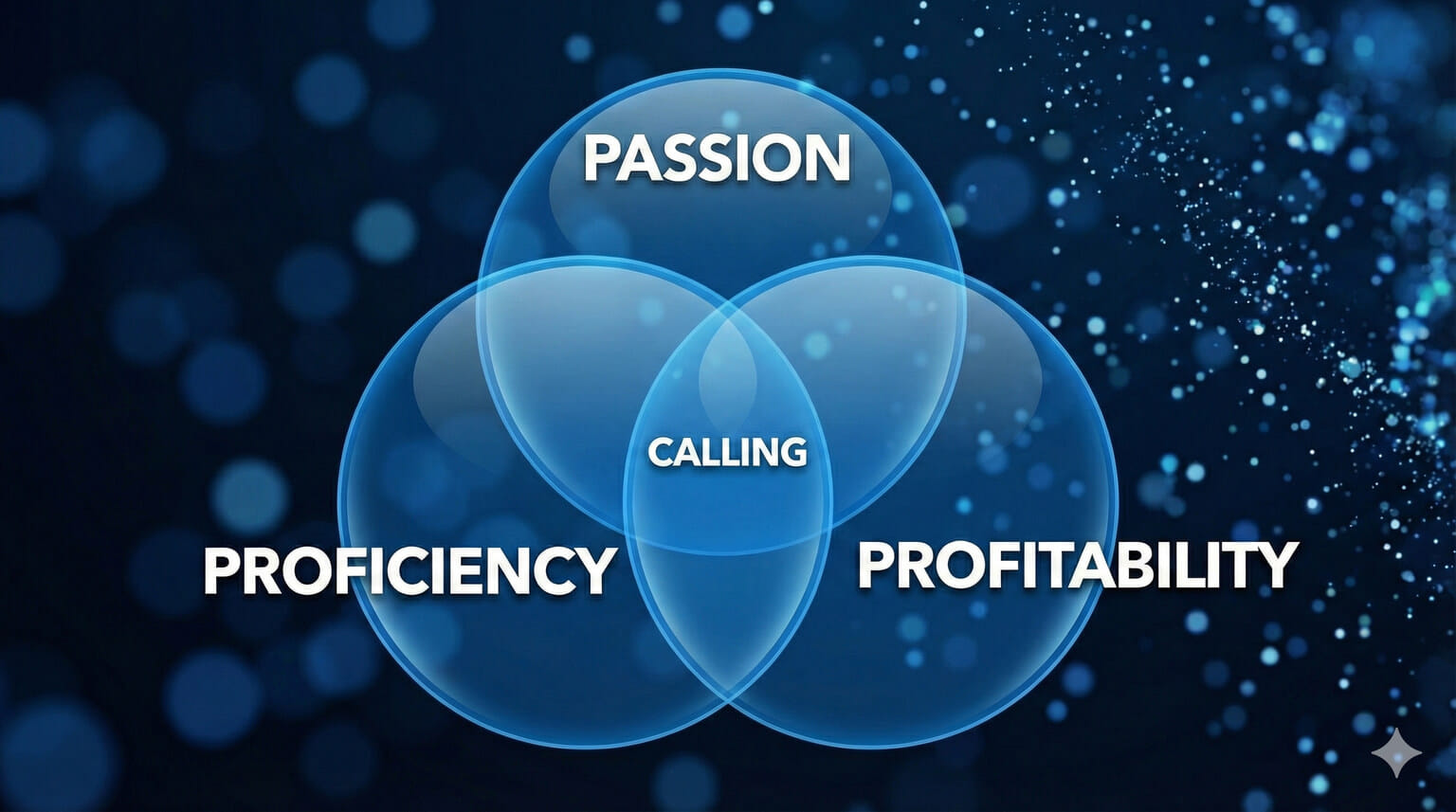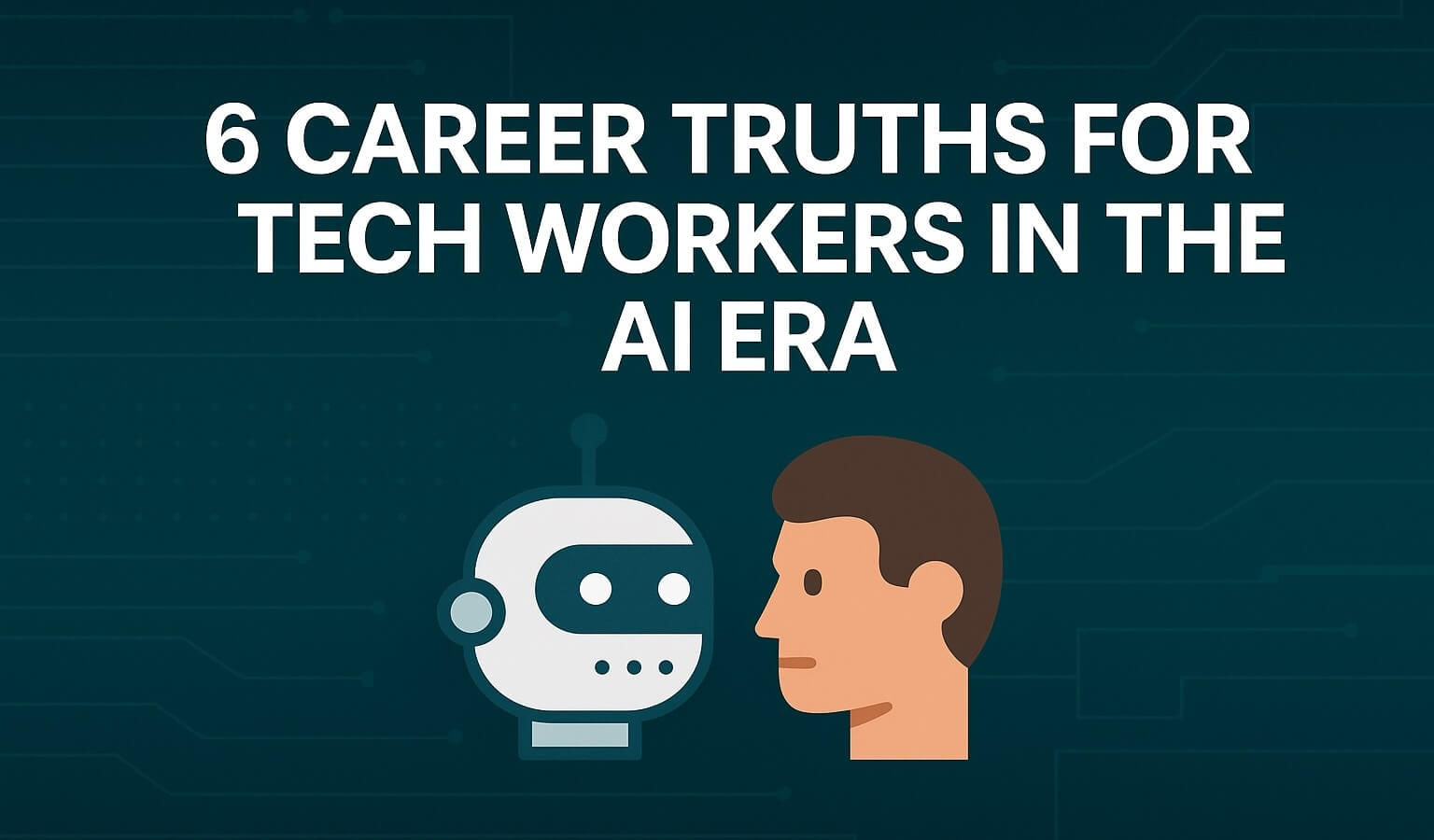So you just graduated with a 4-year computer science degree, or you are soon to graduate with one.
Congratulations! 🎓
But let’s be real…
Unless you live under a rock, you’re probably more concerned than excited about entering this chaotic tech job market.
The scary reality you’re facing:
- Record layoffs in 2023 and continuing into 2025
- AI writing code faster than you can say “Hello World”
- Your 4 years of hard work might feel like expensive debt

The question keeping you up at night: Did I just waste my money? Did I choose the wrong career?
This exact question floods my YouTube comments daily from anxious new grads.
Here’s the truth: You did NOT waste your money.
After almost 10 years in the industry, I’m going to give you 6 battle-tested strategies to not just survive, but thrive as a new grad software engineer.
💡 Key insight: The doom and gloom is surface-level thinking. Your parents’ job-hunting tactics won’t work in 2025. You need to think BIGGER about the opportunities ahead and layoff-proof yourself in the process.
What You’ll Learn in This Guide
✅ The mindset shift that separates successful new grads from the struggling ones
✅ How to become “unlayoffable” through strategic networking
✅ Why being a generalist first will accelerate your career
✅ The specialization strategy that puts you in control
✅ Career fluidity tactics for long-term success
✅ Why AI creates MORE opportunities (not fewer) for developers
Ready to transform your anxiety into excitement? Let’s dive in.
6 Proven Strategies for New Grad Software Engineers
1. The Starting Point: Embrace Strategic Humility
The harsh reality check: Before we talk opportunity, let’s talk humility.
You see the $150K+ salaries on Reddit. The fancy job titles. The success stories. You have a degree they don’t, and you think the industry owes you a job.
Plot twist: It doesn’t.
You’re a newbie with little real-world experience. That diploma doesn’t guarantee anything for a new grad software engineer.
The pride trap that kills careers:
- ❌ Expecting 6-figure starting salaries
- ❌ Turning down “low” offers
- ❌ Acting like you know everything
- ❌ Correcting senior developers on day one
The winning approach instead is to:
💰 Take the $50K job and work it for a year. Experience trumps salary in year one.
🎯 Accept the paid internship. Work extra hard to convert it to full-time.
👂 Enter with ears open, mouth closed. Your mid and senior-level coworkers have the real-world experience you desperately need.
📈 Step 1 - Action items:
- Set realistic salary expectations for your market
- Apply to internships alongside full-time roles
- Practice active listening in technical discussions
- Ask questions instead of providing corrections
Remember: Your first job is about gaining experience, not maximizing income. The money comes later.
2. Become “Unlayoffable”: Build Your Personal Brand
The secret weapon: Visibility in the tech community.
While other new grads send out hundreds of resumes into the void, you’ll have recruiters reaching out to YOU.
The daily routine that changes everything:
🐦 X (Twitter) Strategy:
- Post 2-3 thoughtful tech posts daily
- Reply to 10+ people in your field
- Cross-post everything to LinkedIn
- Use the same profile picture for months (consistency = recognition) so that people keep seeing your face pop in and out of discussions.
📰 Stay informed:
- Subscribe to industry newsletters (like TLDR or might I even suggest the Travis Media newsletter 👈).
- Join tech communities (Reddit, Discord, Slack groups)
- Read industry discussions (but don’t comment yet!)
🧠 Start forming your own opinions:
This is the crucial step most people skip. You can’t just consume. You need to learn to think.
- Buy a $1 notebook or a quality journal - write daily thoughts about what you’re reading
- Ask yourself: “Do I agree with this? Why or why not?”
- Connect different ideas: “How does this relate to what I learned yesterday?”
- Develop your own perspective on industry trends
Only after you have opinions can you meaningfully join discussions.
✍️ Content creation system:
- Share your formed opinions on X and LinkedIn
- Start a blog on Medium or Substack (not for money, for visibility)
- Break down complex topics into Twitter threads with YOUR take
- Share your learning journey - document what you’re building
The compound effect:
Month 1: You’re posting into the void
Month 3: People recognize your profile picture
Month 6: You’re part of tech conversations
Month 12: Recruiters are sliding into your DMs
Goal: Don’t be a nobody in tech. (Watch my full video on this)
Your network becomes your net worth. When layoffs hit, you’ll have dozens of people vouching for you and rooting for you.
📈 Step 2 action - 30-day challenge:
- Set up consistent profiles on X and LinkedIn
- Write your first “learning in public” post
- Subscribe to 3 tech newsletters
- Comment on 5 industry posts daily
- Publish your first Medium article
3. Build Your Lego Foundation: From Theory to Practice
The college reality: Your degree is like Legos dumped on the floor.

You learned data structures, algorithms, computer hardware, math, and coding theory. But it’s far from a complete Death Star - it’s scattered pieces!
The skills gap every new grad software engineer faces:
❌ What college taught: Perfect algorithms on whiteboards
✅ What work demands: Debugging a memory leak at 2 AM
❌ What college taught: Clean, isolated code problems
✅ What work demands: Legacy codebases with zero documentation
❌ What college taught: Individual assignments
✅ What work demands: Collaborating with distributed teams
The truth bomb: Most grads say their degree didn’t prepare them for their first job AT ALL.
But here’s what they miss: You learned the right foundation. Non-traditional developers would kill for your theoretical knowledge.
Your mission: Become a problem-solving generalist
Businesses love good generalists.
The skills companies look for:
- Ability to debug critical production issues under pressure
- Experience deploying both Windows and Linux systems
- Capability to write automation scripts that save hours of work
- Skill in translating technical complexity into business value
- Adaptability to any technology stack quickly
Why generalists win:
Business truth: Companies love engineers they can trust with ANY problem. Specialists solve specific issues. Generalists solve business challenges.
📈 Step 3 action - 90-day generalist game plan:
- Set up both a Windows and Linux development environment
- Build and deploy a simple app to AWS/Azure/GCP
- Write a script that automates a boring task
- Contribute to an open-source project
- Learn Docker basics and containerize an application
Remember: You have the knowledge. Now you need the practical application skills.
4. Glue the Legos: The Power of Strategic Specialization
Now that you’re a solid generalist…
You can figure out any technology (because it’s all the same under the hood). Time to add a specialization.
Critical insight: This isn’t either/or - it’s BOTH.
The winning formula:
Generalist foundation + Deep specialization = Long term career flexibility
Choose your specialization path:
Love JavaScript? Become an expert in the language and one framework like React/Next.js.
Love C#? Become a .NET expert.
Love IoT, or Internet of Things, then become an expert in that field and with that tooling.
And so forth.
Why this strategy works:
✅ Generalization gets you hired anywhere
✅ Specialization makes you irreplaceable
✅ Both together put YOU in control of salary negotiations and career flexibility
🔥 Pro tip: You can change specializations down the road. JavaScript expert today, AI specialist tomorrow. Your generalist foundation makes this possible.
📈 Step 4 action - Your specialization roadmap:
- Pick ONE specialization that interests you
- Dedicate an hour daily to deep learning
- Build 3 projects showcasing your specialty
- Get certified in your chosen technology (if applicable)
- Join in with specialized communities and forums
The career advantage: While generalists compete on price, specialists command premium rates.
5. Embrace Career Fluidity: Your 40-Year Adventure
The long game perspective: You’re 21-22 with 30-40 years ahead of you. Take a minute now to think about that.
If your first job sucks? That’s just year one.
Here’s the beautiful possibility about tech careers:
- Year 1-5: Software Developer
- Year 6-10: Technical Lead
- Year 11-15: Engineering Manager
- Year 16-20: CTO or Product Strategy
- Year 21+: Entrepreneur or Consultant
And a few examples of how your career can evolve over time:
- The Path Shifter: Started as a developer → moved to systems admin → became a DevOps architect → now leads cloud infrastructure for Fortune 500
- The Domain Expert: Frontend developer → UX engineer → product manager → VP of Product
- The Technical Leader: Backend developer → senior engineer → tech lead → engineering manager → CTO
Tech careers are uniquely fluid: Your programming background creates transferable skills that open doors across endless domains from finance and healthcare to gaming, AI, and space tech.
Unlike most professions locked into narrow paths, you have role diversity spanning technical, managerial, and entrepreneurial directions.
Add in the geographic flexibility of remote work, and you have unprecedented career freedom that most industries simply can’t match.
Every 2-3 years, ask yourself:
- Am I excited to learn more in this role?
- Does this align with my current life priorities?
- What would I regret NOT trying?
The permission you need to internalize today: You don’t have to be the same thing forever.
📈 Step 5 action - Career pivot checklist:
- Identify transferable skills from current role
- Network in your target domain
- Take on cross-functional projects
- Build relevant side projects
- Find mentors in your target area
6. Why the Opportunity Is Absolutely Massive
“But Travis… I’m still worried I made a mistake choosing tech.”
Let me blow your mind with the reality of your situation.
The tough market truth:
- Yes, you’re entering a challenging market
- Yes, we’ve had layoffs and economic uncertainty
- BUT this is cyclical, not permanent
Historical perspective: Tech has survived the dot-com crash, the 2008 recession, and COVID. It always comes back stronger.
The AI reality check:
❌ Victim mindset: “AI will replace me”
✅ Winner mindset: “AI will amplify me”
Here’s what everyone misses about AI:
Yes, AI can write simple code, but this then frees you to solve complex problems.
Yes, AI can handle repetitive tasks, which then frees you to focus on architecture and innovation.
But here’s the mind-blowing truth about your career choice:
EVERYTHING around you is built by people with your skillset:
🚗 Your car’s software systems
💳 Every payment processor
☁️ All cloud infrastructure
📱 Every app on your phone
🏦 Banking systems worldwide
🎮 Gaming platforms
🏥 Hospital management systems
🚀 Literally rockets to space
You’ve unlocked the skillset behind EVERYTHING in modern society.
Let’s hypothetically say AI can handle 20% of current coding tasks. This means 20% of developers are free to innovate on cutting-edge tech, which results in brand new industries emerging that need YOUR skills. And, to state the obvious, AI systems themselves need developers to build them
Think about it: Can AI easily replace the people it depends on to exist?
The bottom line: You’re not entering a dying field. You’re entering the field that builds the future.
📈 Step 6 action - Embrace the AI opportunity:
Instead of fearing AI, learn to work alongside it. Position yourself as an AI engineer who can build production-ready applications with large language models.
- Take one of these two top-rated AI courses:
- Build a simple AI-powered application as a portfolio project
- Join AI/ML communities and follow AI thought leaders
- Experiment with AI tools in your daily coding workflow, at least utilizing one of the popular LLMs for simple and repetitive tasks.
🔥 Pro tip: Check my regularly updated Udemy deals page for the lowest prices—Udemy runs sales constantly.
Your Next Steps: From Anxiety to Action
Stop worrying about AI taking that legacy Java role you’d hate anyway.
Start thinking bigger about the infinite opportunities in front of you.
You’re not just a “person who writes code.” You are:
- 🧠 A problem solver
- 💡 An innovator
- 🗣️ A technical translator
- 🏗️ A digital architect
The reality: Tech isn’t getting sucked up by AI. Tech is exploding because of AI. And you have the skillset to ride this wave.
Watch the Full Video
If you prefer video content or want to reinforce what you’ve learned, here’s the complete guide in video format:
The Truth About Your Future
If you’re a new grad software engineer worried about AI, layoffs, or whether you chose the right career, remember this: you didn’t waste your money. You invested in the most valuable skillset of the 21st century.
Tech needs builders, thinkers, and problem-solvers. AI needs shepherds, not replacements.
Your degree isn’t a guarantee — it’s a foundation. What you build on top of it determines your success.
Frequently Asked Questions for New Grad Software Engineers

1. How can a new grad software engineer stand out in a tough job market?
The best way is to combine humility with visibility. Take any opportunity that gives you real-world experience, and start building a personal brand online. Share your learning journey, contribute to open-source projects, and connect with industry peers on LinkedIn and X. Recruiters notice consistent activity.
2. What salary should a new grad software engineer expect in 2025?
While six-figure offers exist, they are not the norm. Depending on location and company size, many new grad software engineers start between $55K–$90K in the U.S. Focus less on the number in year one and more on gaining skills that set you up for higher-paying roles later.
3. Is AI replacing new grad software engineers?
No. AI handles repetitive coding tasks, but this creates more opportunities for engineers to focus on architecture, problem-solving, and building production-ready systems. New grad software engineers who learn to use AI as a tool will have a massive advantage over those who avoid it.
4. What is the best strategy for a new grad software engineer in their first year?
Say yes to opportunities, even if they’re not glamorous. Join teams where you can learn from senior engineers, practice debugging in real environments, and see how software impacts the business. Your first year isn’t about maximizing income. It’s about building the foundation for the rest of your career.
Let’s Connect
Drop a comment below with your biggest concern about starting your tech career. I read every single one and often create content based on your questions.
Want more career insights? Subscribe to my newsletter for weekly updates on navigating the tech industry.
Your journey starts now. Make it count.
This page may contain affiliate links. Please see my affiliate disclaimer for more info.



